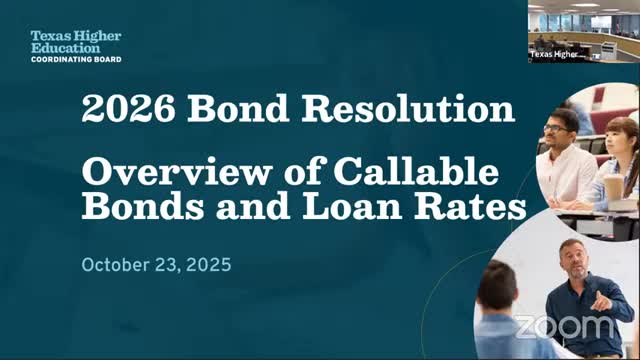Board authorizes up to $100 million in college student loan bonds, delegates sale authority to commissioner and CFO
Get AI-powered insights, summaries, and transcripts
Subscribe
Summary
The board approved a resolution authorizing up to $100 million of tax‑exempt private activity bonds to support the College Access Loan (CAL) program and delegated authority to executive staff to execute sales and potential refundings within prescribed limits.
The Texas Higher Education Coordinating Board on Oct. 23 adopted a bond resolution authorizing up to $100,000,000 in tax‑exempt private activity bonds to fund the College Access Loan (CAL) program and delegated authority to the commissioner and chief financial officer to finalize and execute sales and refundings within specified parameters.
Why it matters: The CAL program uses bond proceeds to fund student loans. The board’s action provides the legal delegation necessary to issue bonds for loans and to refund older series if market conditions indicate net present value savings.
What the resolution authorizes
Anthony Infantini, the board’s chief financial officer, presented the resolution and said it authorizes the issuance of up to $100 million for new student loans and also authorizes refunding of callable series as appropriate. He said the board may issue bonds competitively or by negotiated sale and that legal and tax constraints — including a requirement that refundings generate present value savings and limits in tax law — will shape any refunding strategy.
Bond counsel Richard Donahue and financial adviser Tim Webb provided legal and market context. Donahue explained the resolution delegates authority for up to one year and sets parameters such as a maximum interest rate of 15% and a maximum maturity of 40 years. He said refunding par cannot exceed the par amount of bonds being refunded, a constitutional requirement.
Tim Webb, Hilltop Securities, described the market advantage of the program’s credit structure: because the bonds are general obligation bonds carrying the state’s full faith and credit they receive the state’s AAA credit in the market. “You are in the fortunate position... the only issuer in the country for student loan bonds that is a GEO‑rated issue,” Webb said, explaining that status supports competitive sales and attractive rates.
Refunding considerations and timeline
Staff noted that several older series — 2013, 2014, 2015 and especially 2016 — are potential refunding candidates, with the 2016 series becoming callable in August 2026. Presenters discussed the federal tax arbitrage rules that can arise if loan yields exceed bond yields beyond allowable spreads and said the agency intends to consider passing savings through to borrowers rather than incur tax liability where feasible. Financial advisers ranked roughly a 3% net present value savings threshold as a practical trigger for executing refundings, but said the board’s staff will monitor markets and run updated analyses regularly.
Action: The board voted to adopt the resolution authorizing issuance and delegating sale/refunding authority to the commissioner and CFO.
Ending: Staff and advisers said they will continue to monitor market conditions and report back to the board as refunding opportunities crystallize.
